 Libri di Jan Bremmer su Unilibro.it
)
Libri di Jan Bremmer su Unilibro.it
)
|
|
1918 |
 Title :
Figures of Ezra
Title :
Figures of EzraAuthor: Bremmer Jan N. (EDT), Hirschberger Veronika (EDT), Nicklas Tobias (EDT) Publisher: Peeters Pub & Booksellers € 95,60
|
|
|
1917 |
 Title :
Maidens, Magic and Martyrs in Early Christianity
Title :
Maidens, Magic and Martyrs in Early ChristianityAuthor: Bremmer Jan N. Publisher: Mohr Siebrek Ek € 252,90
|
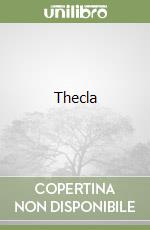 Title :
Thecla
Title :
TheclaAuthor: Barrier Jeremy W. (EDT), Bremmer Jan N. (EDT), Nicklas Tobias (EDT), Tarrech Armand Puig I. (EDT) Publisher: Peeters Pub & Booksellers € 98,80
|
|
1916 |
 Title :
The Ascension of Isaiah
Title :
The Ascension of IsaiahAuthor: Bremmer Jan N. (EDT), Karmann Thomas R. (EDT), Nicklas Tobias (EDT) Publisher: Peeters Pub & Booksellers € 78,60
|
|
|
1910 |
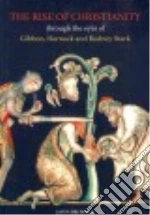 Title :
The Rise of Christianity Through the Eyes of Gibbon, Harnack and Rodney Stark
Title :
The Rise of Christianity Through the Eyes of Gibbon, Harnack and Rodney StarkAuthor: Bremmer Jan N. Publisher: Barkuis Pub "The rise of Christianity up to the victory of Constantine has often been studied and remains a puzzling phenomenon. In this valedictory lecture Jan N. Bremmer concentrates on the explanations adduced, focusing in particular on the works of three iconic figures from the last two hundred and fifty years: "The History of the Decline and Fall of the Roman Empire" of Edward Gibbon, the most famous ancient historian of all time, at the end of the eighteenth century; "Die Mission und Ausbreitung des Christentums" of Adolf von Harnack, the greatest historian of early Christianity of all time, around 1900, and "The Rise of Christianity" of Rodney Stark, the most adventurous sociologist of religion of our times, at the end of the twentieth century. Bremmer locates their concerns and explanations within their own times, but also takes them seriously as scholars, discussing their analyses and approaches. In this way he shows both the continuities and the innovations in the evolving view which scholarship presents of early Christianity"--P. 4 of cover. € 21,30
|
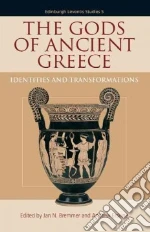 Title :
The Gods of Ancient Greece
Title :
The Gods of Ancient GreeceAuthor: Bremmer Jan N. (EDT), Erskine Andrew (EDT) Publisher: Edinburgh Univ Pr The Greek gods are still very much present in modern consciousness. Although Apollo and Dionysos, Artemis and Aphrodite, Zeus and Hermes are household names, it is much less clear what these divinities meant and stood for in ancient Greece. In fact, they have been very much neglected in modern scholarship. This book brings together a team of international scholars with the aim of remedying this situation and generating new approaches to the nature and development of the Greek gods in the period from Homer until Late Antiquity. The book looks at individual gods, but also asks to what extent cult, myth and literary genre determine the nature of a divinity. How do the Greek gods function in a polytheistic pantheon and what is their connection to the heroes? What is the influence of philosophy? What does archaeology tell us about the gods? In what way do the gods in Late Antiquity differ from those in classical Greece? This book presents a synchronic and diachronic view of the gods as they functioned in Greek culture until the triumph of Christianity. € 181,50
|
|
2008 |
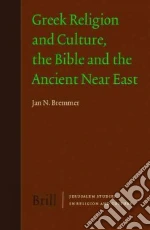 Title :
Greek Religion and Culture, the Bible and the Ancient Near East
Title :
Greek Religion and Culture, the Bible and the Ancient Near EastAuthor: Bremmer Jan N. Publisher: Brill Academic Pub Bremmer (religious studies, U. of Groningen) traces Near Eastern traditions into ancient Greece, uses Greek evidence to elucidate biblical stories, and explores other dimensions of relations between Greece and the Near East and the influence of Greek culture on Hellenistic Judaism and emerging Christianity. The 15 essays are revised from publication during the 1990s and 2000s. Annotation ©2008 Book News, Inc., Portland, OR (booknews.com) € 206,60
|
|
|
2007 |
 Title :
Stranger World of Human Sacrifice
Title :
Stranger World of Human SacrificeAuthor: Bremmer Jan N. (EDT) Publisher: Peeters Pub & Booksellers € 51,30
|
|
|
2002 |
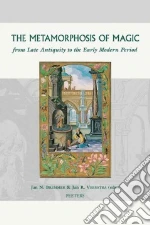 Title :
The Metamorphosis of Magic from Late Antiquity to the Early Modern Period
Title :
The Metamorphosis of Magic from Late Antiquity to the Early Modern PeriodAuthor: Bremmer Jan N. (EDT), Veenstra Jan R. (EDT) Publisher: Isd Bremmer (history and science of religion, Rijksuniversiteit Groningen) and Veenstra (history of philosophy, Rijksuniversiteit Groningen) present 12 papers by an international group of academics from diverse specialties that include philosophy, religion, Byzantine law, and classical studies. In addition to the introduction, Bremmer also contributes an essay on the etymology and meaning of the term magic and an appendix assessing the inter-relationship of magic and religion. Among the topics are the priestly tribe of the Medes known as the Magi and Greek attitudes towards them, the role of Jewish magical lore in Judaism, the influence of Augustine on Christian ideas of magic, and the philosophical implications of werewolf tales in a Christianizing Europe. A substantial bibliography is included. Annotation (c) Book News, Inc., Portland, OR (booknews.com) € 60,60
|
 Title :
La religione greca
Title :
La religione grecaAuthor: Bremmer Jan Publisher: Giordano € 20,66
|
 Title :
The Apocryphal Acts of Thomas
Title :
The Apocryphal Acts of ThomasAuthor: Bremmer Jan (EDT) Publisher: Isd € 38,00
|
|
1994 |
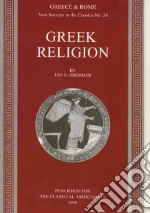 Title :
Greek Religion: Volume 0
Title :
Greek Religion: Volume 0Author: Jan N. Bremmer Publisher: BERTRAMS PRINT ON DEMAND In this brief but highly informative book Jan Bremmer presents an outline of Greek religion in the classical period. After a survey of its main characteristics, he offers a clear and innovative view of the great gods and heroes as well as their sanctuaries and also the main myths, rituals and mysteries: from Athena to Zeus, from sacrifice to the puritan Orphics, from the Indo-European roots to the influence of the ancient Near East. The approach pays attention to the sociological, anthropological and psychological aspects of Greek religion and also to the gender roles. By analyzing the often modern origin of many of the notions employed in the analysis of Greek religion, it also shows the difference between the polytheism of the Greeks and the place of religion in modern Western society. Its excellent bibliography makes this book a very useful tool for students and teachers alike. € 25,10
|
|
|
1987 |
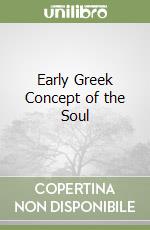 Title :
Early Greek Concept of the Soul
Title :
Early Greek Concept of the SoulAuthor: Jan N. Bremmer Publisher: BERTRAMS PRINT ON DEMAND Jan Bremmer presents a provocative picture of the historical development of beliefs regarding the soul in ancient Greece. He argues that before Homer the Greeks distinguished between two types of soul, both identified with the individual: the free soul, which possessed no psychological attributes and was active only outside the body, as in dreams, swoons, and the afterlife; and the body soul, which endowed a person with life and consciousness. Gradually this concept of two kinds of souls was replaced by the idea of a single soul. In exploring Greek ideas of human souls as well as those of plants and animals, Bremmer illuminates an important stage in the genesis of the Greek mind. € 20,50
|